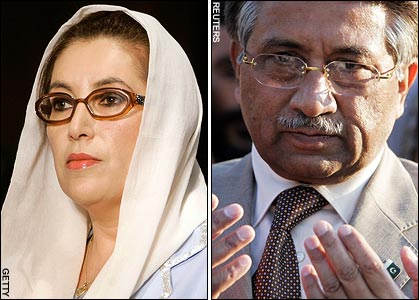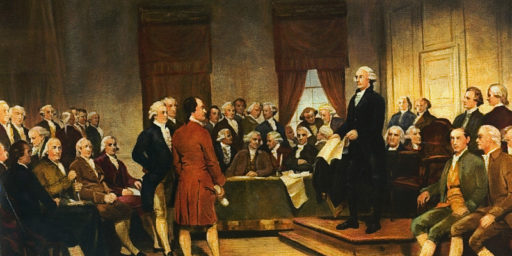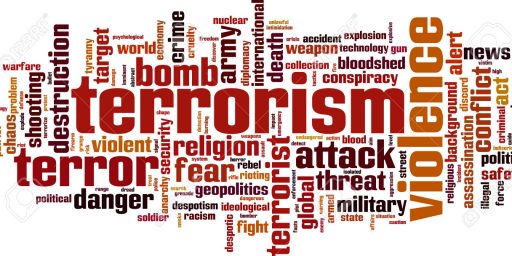Pakistan Dictator Consolidates Power
Nick Gvosdev, editor of The National Interest, draws some parallels with Indian politics from three decades ago.
I realize that neither Pakistanis nor Indians may appreciate comparing General Pervez Musharraf with Indira Gandhi, but I can’t help but note some of the parallels between Musharraf’s decision and the one taken by Gandhi back in 1975. Both were facing Supreme Court decisions that could have affected their ability to remain in power; both were coping with an emboldened political opposition; both had their own in-house militants/terrorists (Naxalites in India; Al-Qaeda/Taliban in Pakistan); and both made the argument that law and order was needed to ensure a real transition to democracy at some undisclosed point in the future.
An interesting prediction, then: when Gandhi lifted the Emergency in 1977, she thought she was going to sweep parliamentary elections because there had been economic growth and stability; instead, the opposition managed to finally unite and swept the vote. So it may be that the impact of this emergency in Pakistan will be to finally get a fractious and divided opposition to work together. Again, however, the experience in India in the late 1970s showed that over time a religious conservative and a secular socialist coalition could not endure in government–again possible lessons for Pakistan.
May it be so. Commenters correctly note that Gandhi was at least elected democratically whereas Musharraf seized power via military coup. That’s seldom a direct path to true democracy, since it legitimates the right of the generals to decide that the politicians are making a mess of things and it is therefore the duty of the military to take the reins.
Shahan Mufti and Mark Sappenfield, correspondents for the Christian Science Monitor, cut through Mushararraf’s self-justification.
Despite his assertions to the contrary, his decision has little to do with terrorism, analysts say, adding that his was a political calculation. With the Supreme Court threatening to declare his presidency illegal in a ruling this week, Musharraf struck preemptively against his foes.
Under the emergency order, he has sacked more than half of the Supreme Court, jailed up to 500 opposition party leaders, and shut down the independent media — assuming that the US has invested too much in him and the war on terror to withdraw its patronage. The order may also delay parliamentary elections, which had been scheduled to take place before Jan. 15.
It marks an important moment for former Prime Minister Benazir Bhutto. As one of the last opposition figures who is not under arrest, she is uniquely situated to rally the masses against the president, says Hassan Askari Rizvi, an independent political scientist. Whether she does could determine how long Musharraf survives politically. “Much depends on Bhutto,” says Professor Rizvi. “If she decides to go to the streets, it can make an impact.”
Over the long term, however, Musharraf’s decision risks exposing his weaknesses further. During the five years since Pakistan’s last elections, Musharraf has always had at least the appearance of a democratic government supporting him. Now, that has all but vanished, and if either Bhutto or the lawyers can mount significant public opposition to him, the Army might be left with no option but to dispense with one of their own — as they have done before.
There are no early signs that Bhutto or the military are going to make any moves in that direction, however, and the Bush administration’s options are exceedingly limited given the wars in Iraq and Afghanistan.
Steven Taylor draws yet another historical parallel: “US support for the Shah’s regime was linked to anti-communism, just as our alliance with Musharraf was linked to anti-terrorism. In both cases the foreign policy goals trumped all else.” For those not old enough to remember, let’s just say that didn’t end well.
Then again, absent a policy change much, much earlier, it’s far from clear what else the United States could have done. President Carter perhaps made the worst of all decisions, simultaneously refusing to back the Shah against Khomeini and his goons and yet giving him sanctuary in the United States and thus further inflaming anti-American sentiments. Still, it’s not as if Jeffersonian democracy was an available policy option.
Similarly, it’s far from clear what it is that the Bush administration can do at this point. Musharraf is a thug and, contrary to the old saw, he’s not really even our thug. But it’s not at all clear that Bhutto is a much better option, much less that there’s much we can do to bolster the democratic opposition. Indeed, the United States taking an active role in Pakistani internal affairs would almost certainly hinder rather than help our cause.






Shanta Devarajan, Chief Economist of the World Bank South Asia Region, comments on his blog (http://endpovertyinsouthasia.worldbank.org/) about the situation in Pakistan:
While much is being (and will be) written about the politics of the situation, any analysis of the implications of this event for poverty reduction (the objective of this blog) will have to consider the following facts. Since 1999, the Pakistan government has undertaken a series of macroeconomic and structural reforms and Pakistan’s GDP growth rate has accelerated. It has been averaging well over 7 percent a year over the last three years. Poverty has been declining steadily at about one percentage point a year during this period. Despite rising world oil prices, inflation has largely been kept under control. Nevertheless, there are two sources of concern on the macroeconomic front. The current account has gone from a surplus of one percent of GDP four years ago to a deficit of 4.9 percent of GDP today. And export growth has declined sharply from 14 percent a year two years ago to 3 percent this year.
Moreover, Pakistan suffers from a huge “human development deficit.” In 1997, child mortality rates in Pakistan and Bangladesh were the same, at about 114 child deaths per 1000 births. Today, Bangladesh’s rate is 77 and Pakistan’s 101. In addition to low enrolment rates, especially for girls, there is evidence that the quality of education is extremely poor. In a sample of (better off) Punjabi villages, the share of 10-year-olds who could do single-digit addition and subtraction was 29 percent. These problems of basic service delivery cannot be solved without the active participation of communities and parents. In fact, the number of private schools has risen dramatically–from 32,000 in 2001 and 47,000 in 2005.
Finally, in the discussion about the rise of fundamentalism in Pakistan, two statistics are worth bearing in mind. Of the total number of enrolled children, the percentage enrolled in madrassahs is between 1-3 percent. And the maximum percentage of the vote won by fundamentalist Islamic parties in elections is 11 percent.
http://endpovertyinsouthasia.worldbank.org/emergency-rule-and-poverty-reduction-pakistan
Perhaps democracies don’t work in Islamic countries.
Bush’s great ally shows his true colors…
Musharraf is a patriot.
It is clear why Bush and he are so close. Musharaf’s hand was forced by activist judges and the need for protecting the country from terrorists.
As Bush has said numerous times, these same forces–judicial activism and terrorism–are threatening the very viability of the US as a functioning state.
Hopefully Bush will take a page out of his ally’s book and suspend our own constitution, stay on as leader, and insure that we are safe from activist judges and evildoers.
Only be doing away with the quaint Consitution can our freedoms be maintained.
I certainly look forward to hearing or reading the reactions of the various presidential aspirants to the crisis. My guess is that they’re probably in the same boat as the Bush Administration—they’ll recommend continuing to back Musharraf because they don’t know what else to do.
I think it’s also important to note that aid and support programs tend to take on a life of their own. There’s a substantial constituency both in the State Department and outside the U. S. government for maintaining support for Pakistan. Is there a comparable constituency that opposes it? I doubt it.